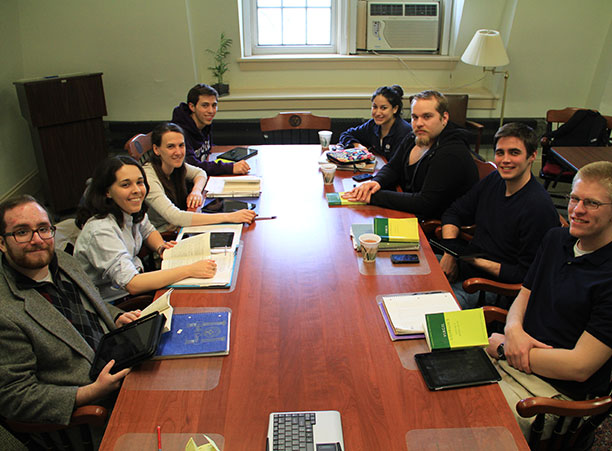Aaron Seider, assistant professor of classics at Holy Cross, found a new way to engage students in ancient stories.
As part of his spring semester course, Vergil’s “Eclogues” and “Georgics,” eight students created 15 minute podcasts about the poetry by Vergil, the most famous and influential author of ancient Rome.
Each podcast recording of about 15 minutes centers on a 15-20 line passage from Vergil. Aimed at a general audience, the students introduce each passage, give its relevant historical, cultural and literary context, read the Latin and their English translation, and offer their own analysis of the passage.
“The idea is that they put the same scholarly research and thought into this podcast as they would for a term paper, but that the end result of this work is a treatment of the passage that should bring across their own interests and analysis to a general audience.”
Each of the students in the course was provided with iPads as part of the College’s iPad pilot program. Seider learned more about using the iPad in training last summer, and then developed the specific assignments with help from the Center for Teaching and his colleagues in the classics department. He says he wanted his students to be able to discuss their ideas and communicate their excitement for the work to a larger and more diverse audience.
“I think it’s great when we can have discussions in class about a certain technical aspect of a poem or about an argument another scholar has made, but I think it’s just as vital, maybe even more so, that our students can talk about what they study and why it’s important to them to a general audience.
“With so much of our culture’s focus on delivering information orally, I thought that the iPads offered a really excellent opportunity for my students to produce a podcast that communicates what they find remarkable in Vergil’s poetry and how that poetry challenges them in a more colloquial way with a wider audience, while still engaging with the scholarly work and thought that would typically go into a term paper.”
Students in the class seem to have relished the challenge.
Charles Schufreider ’17 was initially nervous about the project. A classics major in the health professions program, he chose a passage within Vergil’s “Georgics” that compares the life of a famer with those who live in the city of Rome.
“While the farmer is shown to live a virtuous life, the city-dwellers are painted as greedy, violent, and generally lacking in redemptive qualities,” he says. “Essentially, sentiments today about yearning for a more simple moral time have their roots as far back as Vergil who seems to yearn for the days when farmers ruled. By focusing on these broad and accessible themes, I felt I was able to make a deeper connection to the text. I very much enjoyed creating this podcast.”
Brooke Tranten ’17, a Catholic studies and history double major, describes the project as “intellectually enriching.”
“As opposed to just writing a research paper or an essay, I feel like I have really become an expert on my 20 lines of Vergil, because I have had to engage so closely with the source material,” she says.
Listen to some of the student podcasts on iTunes
- Brooke Tranten ’17: "Georgics" 1.489-508 (Part 1 of 2)
- Brooke Tranten ’17: "Georgics" 1.489-508 (Part 2 of 2)
Related Information
